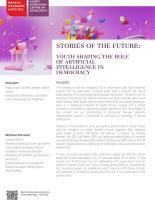Background
Digital technologies and democracy have an ambivalent relationship. The predominant role of digital technologies in our society, particularly emerging technologies such as artificial intelligence (AI), raises many ethical, regulatory and governance issues. Recent scandals surrounding the collection and processing of big data for political communication and opinion manipulation have highlighted the ambivalent relationship between digital technologies and democracy. On the one hand, digital technology can foster innovative forms of citizen participation and give voice to social movements through social networks, online citizen consultations and other civic tech. On the other hand, persuasion techniques based on personal data and disinformation campaigns conducted during the last democratic elections put the trust of citizens in institutions, the press, and electoral processes at risk.
AI plays a major role in three levels of citizen participation, i.e. information, consultation, and decision. AI is now at the heart of the information ecosystem by selecting the information that everyone consults online. AI is also present in surveillance practices, in political communication, and in some citizen consultations. However, its role in citizen-government intermediation remains invisible for a large part of the population. In this context, it is urgent for the population to position itself and choose the conditions for the use of AI. To do this, it is necessary first to raise awareness of the current use of AI in democracy, and, secondly, to bring the subject to the heart of the public space for debate. This is precisely what this project aims to achieve.

























